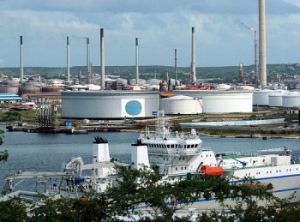Curacao oil refinery nears the point of collapse
 THE HAGUE – The search by the government of Curacao for new investors in the Isla-refinery has so far not been successful, John Samson writes on Caribisch Netwerk. But experts doubt that the population will get cleaner air, even if new investors would be found.
THE HAGUE – The search by the government of Curacao for new investors in the Isla-refinery has so far not been successful, John Samson writes on Caribisch Netwerk. But experts doubt that the population will get cleaner air, even if new investors would be found.
“The refinery is so badly maintained that it nears the point of collapse. Why would a company invest in it?” says Sven Rusticus of GreenTown.
Human rights have been violated for years through the emission of toxic fumes from the refinery, is the sentiment in the Second Chamber. In the districts where the polluted air comes down houses are discolored and iron fences show a green chemical reaction. Several residents have attracted chronical diseases and every year people die of the pollution.
The population has a hate-love relationship with PdVSA, the Venezuelan tenant of the refinery. The government often does not respond when it comes to sponsorship for culture, poverty and school projects; but the refinery has made some of these projects possible. Therefore, PdVSA uses – in spite of all the environmental scandals – proudly the slogan ‘ku kurason pa komunidat’ (with a heart for the population).
Decision makers and civil servants in Curacao have appeared powerless against PdVSA for years. Even now, Prime Minister Rhuggenaath acknowledges in an interview. “It is possible that previous governments were afraid for the consequences if the company does not react properly to certain enforcement. But I would not call that political power.”
Rusticus thinks that the government fears a revolt among the population. “But the advantage is now that the government can say that it has tried everything. The Chinese are not reliable and Venezuela is unable to do it.”
For seven years Rusticus has attempted together with GreenTown to convince politicians to demolish the refinery and to build a new sustainable one. But just like previous governments, Prime Minister Rhuggenaath does not support that idea. He wants to make an attempt to modernize the refinery; he supports the plans of GreenTowm “maybe for the long term.”
“Our objective is that next year companies are going to abide by the current standard.” he says. “We are already talking with the refinery about the investments they are going to do to be able to enforce the rules. We are taking measurements and civil servants are being trained. There will be enforcement.”
Just like Rusticus, Arjan Linthorst of the Foundation Clean Environment is doubtful about the Prime Minister’s promise. “We have litigated a lot of times. But enforcement depends on being able to do it and wanting to do it. Curacao cannot do it; it is a small island and it is not easy for the government to establish enforcement.”
But then there is the will to enforce and that has never existed in Curacao.’ Linthorst says. “Technical expertise could be arranged in no-time with one little request to the Kingdom government.”
Then why does Prime Minister Rhuggenaath believe that enforcing the environmental standards will succeed in 2018? Maybe this is because he does not have another option. “There has never been a public tender and I am unable to look at the alternatives because they don’t exist.” he says.
Chances are significant that the negotiations about a take-over of the refinery by the Chinese state-owned company Guandong Shenrong Energy (GZE) will be terminated. On Radio Direct the government has openly expressed its doubts about GZE’s financial health. The company maintains that reports about its financial troubles are fake news.
If the negotiations with GZE fail, Rhuggenaath hopes that the current tenant PdVSA will continue for a while as an emergency solution until a new tenant has been found for the next couple of decades. But even this scenario is doubtful given PdVSA’s negative financial situation and the recent threat by the Venezuelan president Maduro to boycott the island.
Photo caption: Curacao Isla-refinery. Photo CuracaoChronicle.com.


























